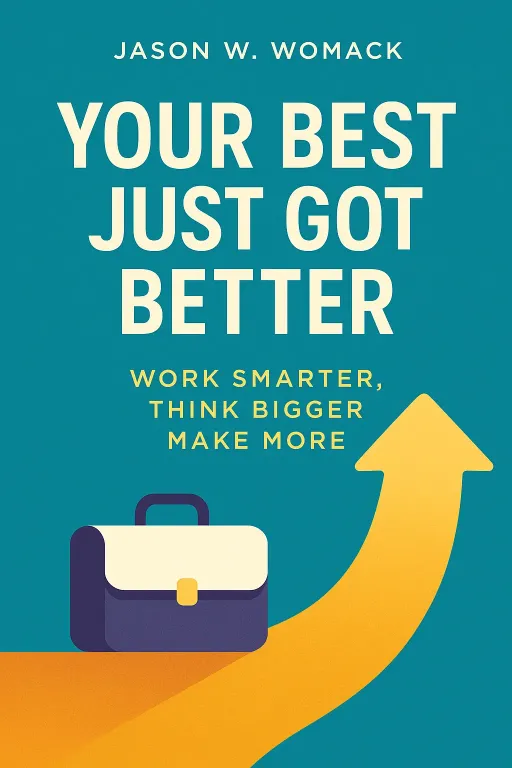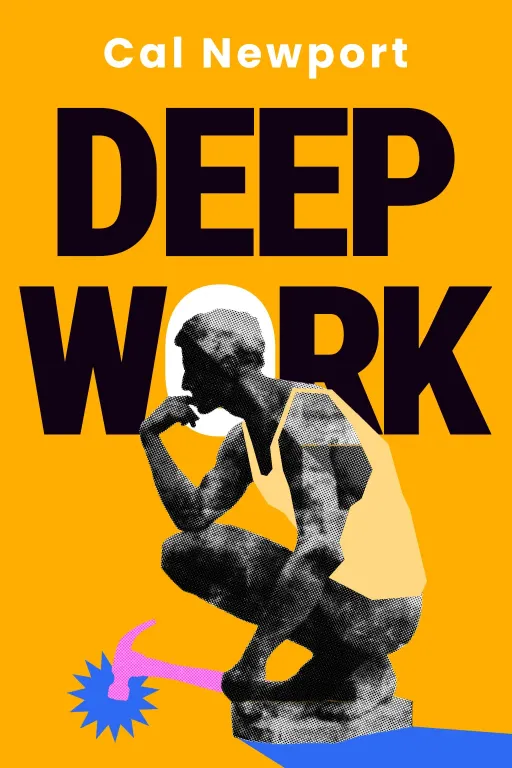
Slow Down to Speed Up
11 minWork Smarter, Think Bigger, Make More
Golden Hook & Introduction
SECTION
Mark: There are 1,440 minutes in a day. The average professional loses 96 of them to interruptions alone. That’s an entire workday lost every single week. What if you could reclaim that time, not by working harder, but by thinking differently? Michelle: Wow, 96 minutes. That’s my morning coffee, my commute listening time, and half my inbox. The idea that it just vanishes into thin air is… painful. It feels like we're constantly told to optimize every second, to hustle, to grind. But losing a whole workday a week suggests that strategy is failing spectacularly. Mark: It absolutely is. And that’s the central promise of a really practical book we're diving into today: Your Best Just Got Better by Jason W. Womack. What's fascinating about Womack is his background—he has Master's degrees in both Education and Psychology. He’s not just a productivity guru; he’s an expert in how we learn and how we change, which gives his advice this unique, sustainable edge. Michelle: An expert in how we change... I like that. Because most productivity advice feels like it's designed for robots, not for messy, distractible humans. It’s always about more discipline, more willpower. So, for someone who understands the human side of it, where does he even start?
The Architecture of Improvement: From 'Ideal Days' to 'Just Get Started'
SECTION
Mark: He starts with a question. A deceptively simple one. Back in 1995, when Womack was a student, his mentor asked him, "Would you know a great day if you saw one?" Michelle: Huh. That’s a good question. I’m not sure I would. I’d know a busy day. I’d know a stressful day. A ‘great’ day? That’s a bit more abstract. Mark: Exactly. And that question completely changed Womack’s trajectory. It prompted him to start a practice he calls writing his "Ideal Day." He would literally write out, in detail, what a perfect day would look, sound, and feel like. At first, it was just an exercise. But over the years, he kept doing it. Michelle: Okay, I have to be honest, this is where my skeptic alarm starts ringing. It sounds a little bit like manifesting, like 'The Secret.' You write down that you want to live in a cabin in the mountains and suddenly, poof, you're a lumberjack? How does just writing something down actually change anything in the real world? Mark: That’s the perfect question, because it’s not magic. It’s about creating a filter for your decisions. Womack tells this great story from Alice in Wonderland. Alice is lost and asks the Cheshire Cat which way she should go. The cat replies, "That depends a good deal on where you want to get to." When Alice says she doesn't much care, the cat says, "Then it doesn’t matter which way you go." Michelle: Right. If you have no destination, you're just wandering. Mark: Precisely. The "Ideal Day" exercise is about defining your destination. It’s not a magic incantation; it's a compass. Once Womack knew his ideal day involved writing, living near nature, and having a flexible schedule, it made his daily choices clearer. He knew which opportunities to say 'yes' to and, just as importantly, which to say 'no' to. Over years, those small, filtered decisions compounded, and he ended up living the life he had described. Michelle: I can see that. It’s less about wishing and more about clarifying. You’re not just hoping for a great day; you’re defining the ingredients so you can start gathering them. But that vision can feel so big and so far away. If my ideal day is to run a marathon and my current reality is I get winded walking up the stairs, that vision can be more demotivating than inspiring. Mark: And that is the exact problem Womack addresses next. He is not a fan of the "Just Do It!" mentality. He finds it intimidating. His mantra is much gentler, and far more powerful: "Just get started." Michelle: 'Just get started.' That feels different. It’s an invitation, not a command. Mark: It's the antidote to being overwhelmed by the grand vision of the 'Ideal Day.' The goal isn't to run the marathon tomorrow. The goal is to put on your running shoes. That's it. That's the start. He tells a story about his mentor, Jim, asking him about his idea to write a book. Womack had been talking about it for months. Finally, Jim just said, "Enough talk already; what are you going to do about this book idea?" That was the nudge. The action wasn't "write a book." The action was "open a document and write one sentence." Michelle: That’s so much more manageable. It’s about breaking the inertia. The hardest part of any task is often the moment right before you begin. It’s the psychological hurdle. Mark: Yes. He frames it as a distinction between being a "noun person" and a "verb person." Noun people have great ideas: "a book," "a promotion," "a healthy lifestyle." Verb people take action: "write a paragraph," "schedule a meeting," "go for a walk." The "Just get started" philosophy is about turning你的 big, scary nouns into tiny, achievable verbs. Michelle: I love that. It takes the pressure off. You don't have to be a 'Published Author' today. You just have to 'write 100 words.' That feels possible. It’s a system for tricking your brain into doing the hard stuff. Mark: It's a system for making the hard stuff feel easy. And that leads directly into his next big idea. Once you've started, how do you keep going without crashing and burning?
The Pacing and Practice of Productivity: Slowing Down to Speed Up
SECTION
Michelle: That’s the million-dollar question. So you have this big vision, your 'Ideal Day.' You've used 'Just get started' to take that first tiny step. But what about the journey itself? Most of us sprint, we burn out, and then the 'Ideal Day' feels even further away than when we started. Mark: Womack has a fantastic, if painful, story about this. He's a triathlete, and he was competing in the Wildflower Triathlon, a really tough race. He finished the bike portion feeling amazing, full of adrenaline, and he started the final leg, the run, way too fast. Michelle: Oh, I can see where this is going. A classic rookie mistake. Mark: A classic. He planned to run the first seven miles at an 8-minute pace. Instead, he ran the first mile in 6 minutes and 12 seconds. He felt like a superhero. But by mile five, he says he "hit the wall." Completely out of gas. He ended up walking, sitting down at aid stations, and his final time was much slower than if he had just stuck to his original, sustainable pace. Michelle: That is the perfect metaphor for modern work culture. That’s the corporate equivalent of answering emails at 10 PM on a Sunday. You feel incredibly productive in that moment, but you're just borrowing energy and focus from Monday and Tuesday. By Wednesday, you're the one sitting at the aid station, completely drained. Mark: Exactly. And this is where he introduces another counterintuitive idea: sometimes, to speed up, you have to slow down. It’s about pacing. It’s about sustainability. It’s not about how fast you can go for one mile; it’s about having the energy to finish all thirteen. Michelle: So how do you practice that? Pacing is a skill. It’s not something you can just decide to do. How do you build that habit? Mark: Through practice. But he reframes the entire goal of practice. He says, "Practice doesn’t make perfect, it makes comfortable." Michelle: Okay, hold on. "Practice makes comfortable." My entire life I've been told practice makes perfect. What does that even mean? Mark: It means the goal of practicing a new habit isn't to execute it flawlessly. The goal is to reduce the friction and discomfort associated with it until it feels normal. Perfection is an intimidating, often impossible standard. Comfort is achievable. Michelle: Give me an example. Mark: He worked with a client who had a terrible morning routine. The first thing he did upon waking was check his work email on his BlackBerry, right there in bed. It immediately filled his mind with stress and a to-do list before his feet even hit the floor. Michelle: I think about 90% of our listeners just felt personally attacked. Myself included. Mark: Right? So Womack didn't tell him to create the "perfect" morning routine with meditation and journaling and a green smoothie. He proposed a simple, five-day experiment. For five days, the client would leave his phone in another room and use a real alarm clock. He would get up, shower, eat, and only check his email on his 40-minute train commute to work. Michelle: Just a five-day experiment. That’s a low-stakes commitment. Mark: Exactly. The goal wasn't to be perfect. It was just to see what it felt like. After five days, the client reported he was less stressed and, surprisingly, more productive. He was clear-headed and ready to tackle his inbox on the train. The new routine wasn't "perfect," but it was more comfortable than the old, stressful one. And because it was more comfortable, it stuck. Michelle: That’s a brilliant reframe. You’re not striving for some idealized version of yourself. You’re just running small experiments to see what makes your life feel better. You're optimizing for comfort, and productivity becomes a side effect. Mark: You're making the better habit the easier, more pleasant habit. And that's how you build a system that lasts. It’s not about a burst of willpower; it’s about designing a more comfortable path forward.
Synthesis & Takeaways
SECTION
Michelle: When you put it all together, it’s a surprisingly gentle approach to high performance. It’s not about hustle culture or grinding yourself into dust. It’s almost… kind. Mark: It is. And it's a beautiful, self-reinforcing loop. You use the 'Ideal Day' to set a clear, inspiring destination. You use 'Just get started' to begin the journey without intimidation. And you use smart pacing and comfort-focused practice to ensure you actually finish the race instead of burning out at mile five. Michelle: It feels like the core message isn't about a new app or a complex system. It’s a fundamental shift in perspective. It’s about giving yourself permission to be both ambitious and human. You can have the big dream, but you can approach it with small, sustainable, comfortable steps. Mark: It’s about being the architect of your experience, not just a firefighter reacting to whatever the day throws at you. The book is highly rated by readers who are willing to do the work, but some have noted it can feel overwhelming if you try to implement everything at once. Womack's own advice would be to just pick one thing. Michelle: That makes perfect sense. So, for our listeners, maybe the takeaway is to not try and overhaul their entire life tomorrow. Instead, just ask that one question: what's one small thing you could 'just get started' on today that moves you 1% closer to your own ideal day? Maybe it's not checking email in bed. Maybe it's just putting your running shoes by the door. Mark: That’s it. One small step. That’s where the best version of you begins. Michelle: A powerful and, dare I say, comfortable thought to end on. Mark: This is Aibrary, signing off.









